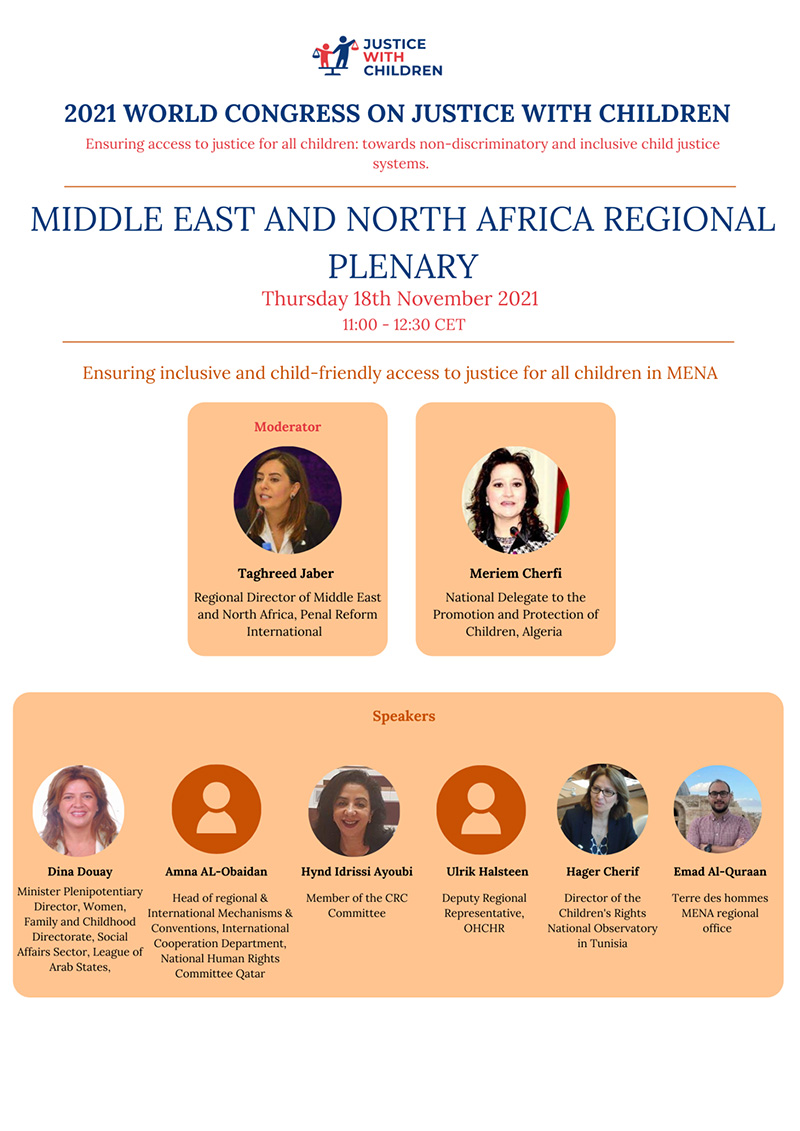| Regional Plenary |
|---|

|
|---|
| Workshops Block A |
|---|
| Session |
Title |
Organiser |
Type |
Language |
Download |
Video |
|---|
| MENA Workshop A1 |
Advancing Gender Justice for Girls and Young Women in the MENA region: A reflection of progress and pending challenges to collectively prioritize and address |
Marta Gil, MENA Regional Programme Coordinator, Acces to Justice, Tdh |
Panel Discussion |
English |
Download |
View Video |
|---|
| MENA Workshop A2 |
Brain Injury & Children in contact with the law |
Prof. Huw Williams, University of Exeter |
Panel Discussion |
English |
Download |
View Video |
|---|
| MENA Workshop A3 |
Alternative pathways to violent extremism: Supporting the reintegration and mental health of children accused and convicted of terrorism-related offences in Iraq |
Simone Cicolin, Access to Justice Technical Coordinator Tdh |
Panel Discussion |
Arabic |
Download |
View Video |
|---|
| MENA Workshop A4 |
When children in conflict with the law are given a second chance – Juvenile Penal Mediation approach |
Mr. Thaer Khalil, Head of Juvenile Prosecution, Attorney General Office, Palestine |
Panel Discussion |
Arabic |
Download |
View Video |
|---|
| MENA Workshop A5 |
The Council of Europe HELP free online courses on children’s rights |
Malika Smaali, Council of Europe |
Training With Certificate |
Arabic |
Download |
View Video |
|---|
| MENA Workshop A6 |
Strategies, Experiences, and Intergenerational Action for the Follow-up to the Global Study on Children Deprived of Liberty in MENA |
Kristen Hope, Terre des hommes |
Panel Discussion |
Arabic |
Download |
View Video |
|---|
| Workshops Block B |
|---|
| Session |
Title |
Organiser |
Type |
Language |
Download |
Video |
|---|
| MENA Workshop B1 |
Legal Aid & Children in the MENA region: addressing gaps and highlighting opportunities- A journey through Arab countries experiences |
Emad Al-Quraan, Tdh MENA regional office |
Panel Discussion |
Arabic & English |
Download |
View Video |
|---|
| MENA Workshop B2 |
Alternatives to Detention measures for Children in Conflict with the Law |
Farah Ishaqat, Tdh, Jordan |
Panel Discussion |
Arabic |
Download |
View Video |
|---|
| MENA Workshop B3 |
Towards a Participatory and a Child-Friendly Justice System – The Arab Child-Friendly Justice Manual as guiding reference |
Khaled Quzmar, DCI Palestine |
Panel Discussion |
Arabic |
Download |
View Video |
|---|
| MENA Workshop B4 |
Fostering the reintegration of children in conflict with the law and enhancing the protection of children in contact with the Law: field experiences from Lebanon |
Hisham Mohsen, TDH |
Panel Discussion |
Arabic |
Download |
View Video |
|---|
| MENA Workshop B5 |
Towards effective national strategies and justice systems addressing violence against girls in the region |
Naser Al Rayes, Arab Women’s Legal Network |
Panel Discussion |
Arabic |
Download |
View Video |
|---|


